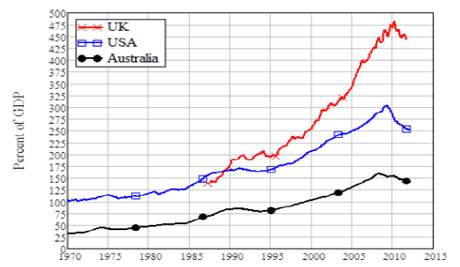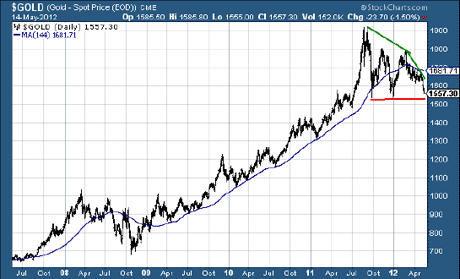What the ant and the lancet fluke can teach you about investing
For investors, the seductive allure of 'groupthink' can infect the brain like a parasite, leading to disastrous financial decisions, says Bengt Saelensminde.
Get the latest financial news, insights and expert analysis from our award-winning MoneyWeek team, to help you understand what really matters when it comes to your finances.
You are now subscribed
Your newsletter sign-up was successful
Want to add more newsletters?

Twice daily
MoneyWeek
Get the latest financial news, insights and expert analysis from our award-winning MoneyWeek team, to help you understand what really matters when it comes to your finances.

Four times a week
Look After My Bills
Sign up to our free money-saving newsletter, filled with the latest news and expert advice to help you find the best tips and deals for managing your bills. Start saving today!
Last Friday, my plan was to send you a quick summary of what went on at this year's MoneyWeek conference. But trying to cram a day's worth of action into one issue of The Right Side was probably always a bit optimistic.
So I've decided to give you some more insights from the event today. I also want give you a few excerpts of the conference presentations to listen to.
Let's crack on still so much to get through...
MoneyWeek
Subscribe to MoneyWeek today and get your first six magazine issues absolutely FREE

Sign up to Money Morning
Don't miss the latest investment and personal finances news, market analysis, plus money-saving tips with our free twice-daily newsletter
Don't miss the latest investment and personal finances news, market analysis, plus money-saving tips with our free twice-daily newsletter
How parasites look after Number One
I had been looking forward to Dylan Grice's presentation. Dylan is a macro-economic strategist at Socit Gnrale. He's one smart guy and has authored and co-authored several fascinating papers on everything from gold to stock-picking.
Dylan showed how as humans we nearly always get caught up in herd behaviour. Worse still, we tend to get caught up in way-out-there' ideas that rarely occur.
These memes', as Grice calls them, are promoted by parasites'. He uses the example of the lancet fluke to show us how. This parasite enters the brain of an ant, giving it an uncontrollable desire to climb to the top of a blade of grass.
And when at the top, he falls off... so he climbs back up again and again... ad-infinitum. Why? Because if the ant is at the top of the grass blade, it's more likely to be ingested by a feeding cow. And that means the parasite has found a new host and can reproduce.
There's a truly fascinating point to Dylan's lancet fluke analogy. He goes on to talk about what he describes as a particularly vicious meme, which is as damaging to your own personal finances and to your wealth as the lancet fluke is to the ant'.
Take a listen to this two-minute excerpt from Dylan.
The point is that these memes are prevalent in the markets too how during the eighties, everyone assumed Japan would go from strength to strength to take over the world. Similarly, at the tail-end of the nineties, bullishness was encapsulated in the best-selling book, Dow 36,000.
The danger Dylan cites is groupthink' - how investors follow the parasites - it keeps them from individual thought. This is riveting stuff - I thoroughly recommend you listen to Dylan's full presentation. I'll show you how you can in a moment.
And you should hear what this next guy had to say too but brace yourself first!
The markets to crash by 65%?
I always take Simon Caufield very seriously, because I know how he successfully piloted his own significant pension fund to profits even through the 2008 tempest.
Simon's theme at the conference was debt and how it's about to savage our stock and asset prices. While most pundits focus on public sector debt, Simon thinks the elephant in the room is private sector debt. This is what will bring markets down, he believes.
Here's a chart from Simon's presentation. It shows UK (red line), US (blue) and Australian (black) private sector debt. Just take a look at that red line here in the UK, we're far more indebted than our American or Aussie friends.
Total private sector debt to GDP: UK, USA and Australia

Source: Professor Steve Keen www.debtdeflation.com
Although it's come down a bit over the last couple of years, private sector debt is still more than 450% of GDP!
And that means there's a lot more deleveraging to go here in the UK. Simon's argument is that as we repay debt, it sucks money out of the economy; basically, it's very bad for business. He predicts several double dips and a stock market slump, and sees fair value of the markets at around 30% - 40% below today's prices.
So why will the markets fall 65%? Here's a brief snippet of Simon's talk.
That's scary. "Asset prices are going to get crushed." Simon goes on to talk about a few ways you can preserve capital well worth listening to.
If the markets do slump, I would expect to see some considerable quantitative easing (QE) coming our way...
There's nothing like a bit of QE to lift gold
You know it wouldn't be a MoneyWeek conference without a bit of gold talk. Fund manager Tim Price revealed how he's raised his gold allocation from 50% to nearer 80%!
Now, if you follow the gold price, you'll know it's not been that pretty of late. Resident gold guru, Dominic Frisby is concerned. Of his many charts, here's one that picks out some key points.
Gold 2007 2012

The black line is the gold price notice how the blue line (144-day moving average) always seems to catch the bottom of any down-move. That is except during the worst moments of the 2008/09 crisis and now.
Basically, the technicals for this chart look ominous. The green line shows how (since last summer's $1,920 top), gold's price deceleration has grown.
But there is some good news. See that red line? Well, the red line marks a level of support at around $1,550. Basically, during this down-phase, gold hasn't wanted to dip below this critical line... and we're trading around those lows today. If it can hold, and Dominic is correct about gold being in a consolidation' phase right now, perhaps we can look forward to a return to the rising gold price.
But, if gold falls through its support level, it'll be bad news basically, gold could fall hard and fast. We should be prepared for that.
I always like to hear Dominic's thoughts on gold. He knows this market more than most, as this excerpt shows.
And if you'd like to know what Dominic's gold price targets are from here, take a listen to his talk in full details in a moment.
The best is yet to come
Now, it sounds like the whole tone of the conference was decidedly bleak. And there were certainly some pretty ominous conclusions from some of the speakers.
But it's not all bad
In last Friday's Right Side I showed you ways you could prosper in these turbulent markets. We looked at Lars Henrikkson's exciting plays on Asia; we also looked at Tim Price and John Burford's market-neutral stance on investing.
But I haven't yet touched on the most exciting bits of all. That is, the individual stocks that some of our top strategists are plumping on.
Paul Hill (editor of Precision Guided Investments), Tom Bulford (editor of Red Hot Penny Shares) and Mike Tubbs (editor of Research Investments) all pointed to three of their favourite stocks. Of course, I can't publish the names here. And I wouldn't have the time to explain each stock's merits anyway. Which means the best is yet to come...
The way it'll come to you is by downloading your personal audio copy of the MoneyWeek conference: Protect & Prosper. You'll get high quality audio files you can listen to on your PC or mp3 player/smartphone as well as the charts and pictures from the presentations too.
Here's how to order your copy now.
There's a whole day's worth of fascinating market analysis, broken into files of the individual presentations. You get talks on investor psychology, ways to trade, and, of course, stock tips.
I thought it was a fascinating day. I'd highly recommend having a listen to see if you agree.
My personal recommendation: make sure you listen to the rest of those talks by Dylan Grice, Dominic Frisby and Simon Caufield that I gave you excerpts of above. And definitely check out Mike Tubbs, Tom Bulford, David Stevenson and Tim Price. What you will hear in those seven talks alone will give you some great ideas. And then there is plenty more on top.
By the way, just to warn you: this conference audio set is only available to order until Wednesday. So to make sure you get hold of it, I recommend you download it now. After that, you can listen to it as many times as you like at your leisure.
Click here for full details of the recording and how to order.
This article is taken from the free investment email The Right side. Sign up to The Right Side here.
Important Information
Your capital is at risk when you invest in shares - you can lose some or all of your money, so never risk more than you can afford to lose. Always seek personal advice if you are unsure about the suitability of any investment. Past performance and forecasts are not reliable indicators of future results. Commissions, fees and other charges can reduce returns from investments. Profits from share dealing are a form of income and subject to taxation. Tax treatment depends on individual circumstances and may be subject to change in the future. Please note that there will be no follow up to recommendations in The Right Side.
Managing Editor: Frank Hemsley. The Right Side is an unregulated product issued by Fleet Street Publications Ltd.
Fleet Street Publications Ltd is authorised and regulated by the Financial Services Authority. FSA No 115234. https://www.fsa.gov.uk/register/home.do
Get the latest financial news, insights and expert analysis from our award-winning MoneyWeek team, to help you understand what really matters when it comes to your finances.
Bengt graduated from Reading University in 1994 and followed up with a master's degree in business economics.
He started stock market investing at the age of 13, and this eventually led to a job in the City of London in 1995. He started on a bond desk at Cantor Fitzgerald and ended up running a desk at stockbroker's Cazenove.
Bengt left the City in 2000 to start up his own import and beauty products business which he still runs today.
-
 Average UK house price reaches £300,000 for first time, Halifax says
Average UK house price reaches £300,000 for first time, Halifax saysWhile the average house price has topped £300k, regional disparities still remain, Halifax finds.
-
 Barings Emerging Europe trust bounces back from Russia woes
Barings Emerging Europe trust bounces back from Russia woesBarings Emerging Europe trust has added the Middle East and Africa to its mandate, delivering a strong recovery, says Max King